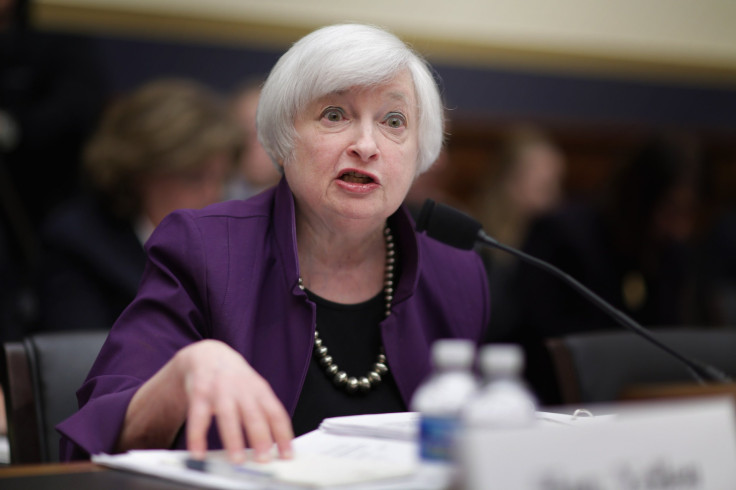Fed Chair Janet Yellen To Address Congress Amid Market Turmoil And Economic Fears

When Federal Reserve Chair Janet Yellen delivers her semiannual monetary policy address to the U.S. House of Representatives Wednesday, Washington lawmakers will sit up and listen. But her true audience will be Wall Street.
Global financial markets have greeted 2016 with four straight weeks of turbulence and decline, with most major stock indexes down at least 10 percent on continued fears of slowing global growth. Recent disappointments in U.S. data have only aggravated those worries, with whispers of recession growing in volume.
For Yellen, the challenge will be twofold. On the one hand, she needs to reassure markets that the Fed has its finger on the pulse of global financial developments. Wall Street analysts largely expect Yellen to sound a dovish tone on future rate increases, given recent market woes. On the other, she will likely seek to play up bright spots in the employment picture and build confidence in the fundamentals of the economy.
“I definitely don’t think she’s going to surprise the markets,” John Vail, chief global strategist of Nikko Asset Management, said. “But the markets can be overinterpretive sometimes.”
Yellen and her Fed colleagues had sanguine expectations coming into the new year. After a rate hike in December — the first since 2006 — Fed officials were expected to ratchet up interest rates roughly four times in 2016 as labor markets tightened and the American economy continued its momentum.
But queasy markets have thrown those assumptions into doubt. Futures market data tracked by the CME Group suggest the odds of a rate hike in 2016 have dropped from a near-certainty to about 50 percent, while the odds of a March move are 1 in 10. “At this stage, it is difficult to see the Fed hiking more than once this year,” Deutsche Bank Chief Economist David Folkerts-Landau said in a note to clients Tuesday.
Confidence in further rate increases has drained alongside declines in demand from China, a central driver of the global economy. Chinese imports fell for the 13th straight month in December. Over the same period the Bloomberg Commodity Index, a basket of commodities tracked by Bloomberg, has dropped more than 30 percent.
The fallout has been felt the world over. U.S. manufacturing fell into two straight months of contraction at the tail end of 2015 with net exports weighing on economic output. And new concerns over the balance sheets of major European lenders has caused warning bells to go off in credit markets for institutions including Deutsche Bank and Barclays.
“The risk that the global malaise spills over to the U.S. is … likely to get a lot of lip service” from Yellen, wrote economists at RBC Capital Markets.
But global financial whirlwinds don’t account for all the domestic economic worries Yellen must address. Consumer spending has lost its step since mid-2015, and companies have sharply reduced their inventories, with small-business confidence at a two-year low.
Implicated in many of these trends is the falling price of oil, which has kneecapped the American energy industry and, together with a strengthening dollar, thrown a wrench into the Fed’s inflation expectations.
The Fed’s preferred measure of core inflation, which excludes volatile food and energy prices, stood at 1.4 percent year over year in December. Including food and energy, the measure drops to just 0.6 percent. Since 2012 the Fed has aimed for 2 percent year-over-year gains in core consumer prices. The Federal Reserve is charged with keeping prices in check while encouraging full employment.
Recent jobs data could make Yellen more optimistic on the pace of inflation, however. U.S. workers saw wage gains edge up to 2.7 percent in December and 2.5 percent in January, as slack continued to drain from the reserves of labor trapped on the sidelines of the economy. Closely watched job openings data released Tuesday showed Americans quitting their jobs at the highest rate since April 2008 — a positive sign for labor markets.
“The macroeconomy is actually pretty solid,” Vail said, noting acceleration in wage growth along with strength in the housing market. “It’s hard to say that everything is dark when they’re actually achieving their main goal.”
That’s not a message markets are necessarily clamoring to hear, however. “They’re agonizing over what’s happening to financial markets and wishing the Fed would be reactive to that,” Vail said.
Yellen is scheduled to address the House Financial Services Committee at 10 a.m. ET Wednesday. She will deliver similar remarks to the Senate Banking Committee on Thursday morning.
© Copyright IBTimes 2024. All rights reserved.





















